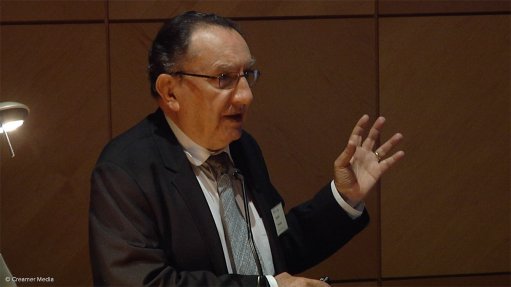
JOHANNESBURG (miningweekly.com) – Quick action was needed to prevent the collapse of the global coal sector, XMP Consulting senior coal analyst Xavier Prevost warned on Thursday.
Addressing the Fossil Fuel Foundation junior coal mining conference – from which two Department of Mineral Resources (DMR) officials down to speak withdrew without sending replacements – Prevost said that if the coal industry failed to survive, it would not be for the want of trying. (Also watch Creamer Media video attached).
“We’ve been doing all kinds of things to try and prevent a total collapse. But the signs are there and if we don’t act quickly and efficiently, we might end up in trouble,” Prevost warned.
Earlier, Shava Mining Enterprise MD Andrew Kinghorn told the conference attended by Creamer Media’s Mining Weekly Online that the export price of coal falling below the domestic price was indicative of State utility Eskom having to pay a lot more for coal than in the past.
Last year Eskom consumed 65% of the coal produced in South Africa.
“Eskom is now paying a lot more for coal and that’s going to impact on all of us because Eskom has a simple solution of passing on to the client and we the customers pay more for electricity, and that’s unfortunately going to be here to stay,” said Kinghorn, who displayed the yearly revenue of South African coal sales on a large screen to indicate graphically how the bottom had fallen out of the global seaborne coal market.
Export coal was barely managing to fetch $60/t, down from as much as $200/t in the past, while domestic coal prices were very good and getting better, Prevost commented.
“The prices in South Africa are opposite to prices in the international market, which have been hit hard,” he said.
Richards Bay prices were higher, however, than other global prices, with notable increased demand from the the Middle East and greater interest being shown in coal by Japan.
MinGeoMet International mining engineer Grant Pitt, who chaired the first round of the conference, called for a task team to be created to ensure that the junior coal-mining sector could be developed locally. (Also watch Creamer Media video attached).
He said the mere granting of large numbers of prospecting rights to prospective junior start-ups had not succeeded in developing junior coal mining companies, despite coal being assured of a strong place in South Africa’s energy mix for the next half century to century.
Prevost flashed up a chart that indicated that a negligible volume of the 333.6-million tons of run-of-mine coal that South Africa produced last year was generated by junior coal miners.
South Africa also ended up with 69.8-million tons of discard coal, for which the country needs to find uses.
Prevost outlined how coal imports from China had plunged and India’s imports had fallen 21%.
He noted in particular that diversified major Anglo American’s coal earnings had fallen 25%, which was bad news, as Anglo was South Africa’s largest coal producer, and illustrated how the total global coal industry was in decline.
The US was finding that one of the ways to survive was to consolidate, which he advocated for South Africa, and defined consolidation as not only becoming smaller but also more business-like, which was the only route to survival.
Large diversified mining companies were considering removing coal from their portfolios and smaller non-diversified companies were taking the full brunt.
Meanwhile the reality was that a developing country like South Africa needed the low-cost energy that coal brought, but investors were fighting shy of coal, which was slowing growth to 2% a year until 2019.
Kinghorn outlined how platinum and coal had been changing places as South Africa’s biggest commodity exports since 2008.
However, from 2011, coal has stayed ahead and was also the first commodity to break through the R100-billion revenue barrier, despite losing R20-billion worth of export business so far this year.
DMR director-general Dr Thibedi Ramontja, who was down to deliver the opening address, apologised for having to attend to urgent overseas business but did not send a replacement, and DMR director small-scale mining Gad Kwata, who was billed to speak on government policy on junior coal mining, withdrew the day before and also failed to send a replacement.